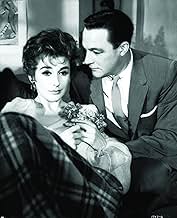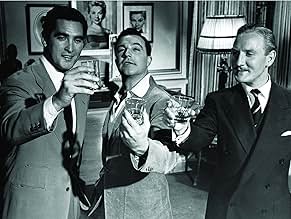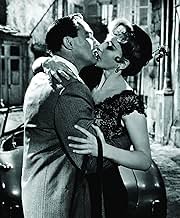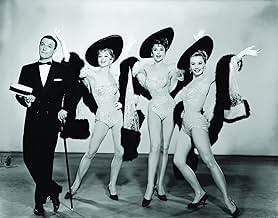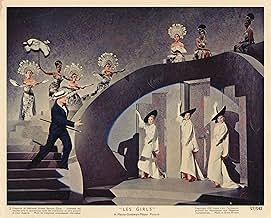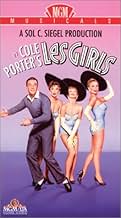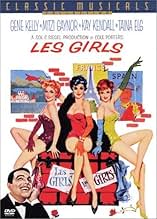VALUTAZIONE IMDb
6,6/10
3228
LA TUA VALUTAZIONE
Aggiungi una trama nella tua linguaThe former members of a dance troupe are suing because of recently published memoirs. Each one insists on own point of view.The former members of a dance troupe are suing because of recently published memoirs. Each one insists on own point of view.The former members of a dance troupe are suing because of recently published memoirs. Each one insists on own point of view.
- Vincitore di 1 Oscar
- 7 vittorie e 7 candidature totali
Richard Alexander
- Stagehand
- (non citato nei titoli originali)
Gordon Armitage
- Courtroom Spectator
- (non citato nei titoli originali)
Frank Arnold
- Taxi Driver
- (non citato nei titoli originali)
Herman Boden
- Angèle's Backup Musician
- (non citato nei titoli originali)
Brad Brown
- Court Barrister
- (non citato nei titoli originali)
Barrie Chase
- Dancer in 'Les Girls' Number
- (non citato nei titoli originali)
Lilyan Chauvin
- Dancer
- (non citato nei titoli originali)
Robert Cole
- Biker in 'Gone About that Gal' Number
- (non citato nei titoli originali)
Recensioni in evidenza
Cole Porter's final film score and next to last music written for any media is Les Girls. The same team producer Sol Seigal and writer John Patrick who produced and wrote the adaption of The Philadelphi Story for High Society worked with Porter again and this time George Cukor was directing. It's a good film, but I've got the feeling that it could have been a whole lot better.
One of the criticisms that Porter used to get annoyed with was the perennial 'it isn't up to Cole Porter's standard' and then you'd look in the score and see a lot of classics. Can-Can is the best example of that. But in the case of Les Girls Porter admitted this to be true. According to the George Eells biography of Porter, he was starting to suffer the decline in health that would eventually end his life in 1964. He did have surgery to bypass an ulcer and was not feeling up to par.
Still the numbers are mostly for a vaudeville act, Barry Nichols and Les Girls so they're serviceable to a bright Rashomon like plot. The members of the act are Gene Kelly and the girls are Mitzi Gaynor, Taina Elg, and Kay Kendall. Kay's written a memoir that includes an alleged suicide attempt by Elg and she's suing her in an English court. As we get testimony from Elg, Kendall, and Kelly, they all give out with different versions. It's also clear he had his fling with all of them at one time despite his alleged no fraternization policy.
Elg has the best ballad of the score, Ca C'est L'Amour which sounds like something that might have been written for Can-Can and discarded. Cole Porter discards are better than a lot of composer's best efforts. The sparkling Kay Kendall was never shown to better advantage on the screen than with You're Just Too Too in a duet with Kelly. And Cole Porter wickedly satirizes Marlon Brando and The Wild One in Why Am I So Gone About That Gal with Kelly and Mitzi Gaynor.
In addition to this being Cole Porter's last film score, this film also marks Gene Kelly's last full blown musical. He did do other musical numbers in films like What A Way To Go and Young Girls From Rochefort and Xanadu, but this was the last musical he did. They were getting way too expensive to make, something Kelly learned from behind the camera when he directed Hello Dolly.
Even with a score that Cole Porter himself wasn't thrilled with, Les Girls is still a fresh bit of film making. And since it's original to the screen, the Porter wit is not edited severely. All in all four great musical performers, three of them Les Girls.
One of the criticisms that Porter used to get annoyed with was the perennial 'it isn't up to Cole Porter's standard' and then you'd look in the score and see a lot of classics. Can-Can is the best example of that. But in the case of Les Girls Porter admitted this to be true. According to the George Eells biography of Porter, he was starting to suffer the decline in health that would eventually end his life in 1964. He did have surgery to bypass an ulcer and was not feeling up to par.
Still the numbers are mostly for a vaudeville act, Barry Nichols and Les Girls so they're serviceable to a bright Rashomon like plot. The members of the act are Gene Kelly and the girls are Mitzi Gaynor, Taina Elg, and Kay Kendall. Kay's written a memoir that includes an alleged suicide attempt by Elg and she's suing her in an English court. As we get testimony from Elg, Kendall, and Kelly, they all give out with different versions. It's also clear he had his fling with all of them at one time despite his alleged no fraternization policy.
Elg has the best ballad of the score, Ca C'est L'Amour which sounds like something that might have been written for Can-Can and discarded. Cole Porter discards are better than a lot of composer's best efforts. The sparkling Kay Kendall was never shown to better advantage on the screen than with You're Just Too Too in a duet with Kelly. And Cole Porter wickedly satirizes Marlon Brando and The Wild One in Why Am I So Gone About That Gal with Kelly and Mitzi Gaynor.
In addition to this being Cole Porter's last film score, this film also marks Gene Kelly's last full blown musical. He did do other musical numbers in films like What A Way To Go and Young Girls From Rochefort and Xanadu, but this was the last musical he did. They were getting way too expensive to make, something Kelly learned from behind the camera when he directed Hello Dolly.
Even with a score that Cole Porter himself wasn't thrilled with, Les Girls is still a fresh bit of film making. And since it's original to the screen, the Porter wit is not edited severely. All in all four great musical performers, three of them Les Girls.
Gene Kelly was one of the most talented and charismatic performers in classic musicals, some of his dance routines being among cinema's most jaw-dropping. And George Cukor was a fine director with a filmography that contained a number of favourites.
Both have done better films than 'Les Girls', in fact everybody involved pretty much has, but the film is definitely well worth watching and is entertaining in its own right. To me, what came off least successfully is the story, which is basically a musical version of Akira Kurosawa's 'Rashomon' (except that film handled its story structure much better). It is certainly intriguing, and it is difficult to resist its often risqué and disarming nature, but it does struggle at times to sustain momentum and material for a running time that feels over-stretched, making the latter half pedestrian narratively. And while interesting the flashback structure doesn't always feel as smooth as it could have been, some of it clumsy and disorganised.
Cole Porter's songs have been criticised for reasons that are understandable. None of the songs are bad, Porter was too good a composer/song-writer to write bad music, and are reasonably pleasant, but this is not one of Porter's better song scores. Pleasant enough, but nowhere near as memorable or as inspired, apart from some witty and naughty lyric-writing (though there are instances where they are over-shadowed by some distracting stage business in the choreography), as they could have been, disappointing for a great composer/song-writer who should have gone out on a high note but didn't. Jacques Bergerac is also insipidly dull in a role with practically nothing to it, basically the sort of role that's there for the sake of being a plot device but nothing more.
Despite how this all sounds, 'Les Girls' does have a number of merits that it is difficult to be too hard on it. The best assets are the production values and the performances of the ladies. 'Les Girls' is simply a stunning-looking film, the colours are eye-poppingly ravishing, the sets are lavish, the costumes are beautifully chic and the cinematography often dazzles. The ladies manage to steal the show under those who most would naturally see the film for (Kelly, Cukor and Porter). Particularly note-worthy is the perfection that is Kay Kendall, who is charming and hilarious and would have had a bigger career if it hadn't been cut short so early and tragically. Mitzi Gaynor also has fun with her role and makes the character sympathetic too, while Taina Elg is suitably sultry.
Kelly is always watchable, and dances with charisma and his usual polish and technical meticulousness in routines that, while not exactly career highlights, do show off how incredible a dancer he was, even if his character is one of his least endearing (though he does bring wit and charm). Cukor makes the most of the production values and there is enough elegance and lightness of touch, but it does seem in the early parts especially that he wasn't in complete control, or entirely trust or was comfortable, with the material. The script is wonderfully witty and also has a risqué boldness and sexiness.
On the whole, not a great film, and doesn't see the enormously talented people in front of and behind the camera doing the best work of their careers, but absolutely worth watching for the production values and Kendall. 7/10 Bethany Cox
Both have done better films than 'Les Girls', in fact everybody involved pretty much has, but the film is definitely well worth watching and is entertaining in its own right. To me, what came off least successfully is the story, which is basically a musical version of Akira Kurosawa's 'Rashomon' (except that film handled its story structure much better). It is certainly intriguing, and it is difficult to resist its often risqué and disarming nature, but it does struggle at times to sustain momentum and material for a running time that feels over-stretched, making the latter half pedestrian narratively. And while interesting the flashback structure doesn't always feel as smooth as it could have been, some of it clumsy and disorganised.
Cole Porter's songs have been criticised for reasons that are understandable. None of the songs are bad, Porter was too good a composer/song-writer to write bad music, and are reasonably pleasant, but this is not one of Porter's better song scores. Pleasant enough, but nowhere near as memorable or as inspired, apart from some witty and naughty lyric-writing (though there are instances where they are over-shadowed by some distracting stage business in the choreography), as they could have been, disappointing for a great composer/song-writer who should have gone out on a high note but didn't. Jacques Bergerac is also insipidly dull in a role with practically nothing to it, basically the sort of role that's there for the sake of being a plot device but nothing more.
Despite how this all sounds, 'Les Girls' does have a number of merits that it is difficult to be too hard on it. The best assets are the production values and the performances of the ladies. 'Les Girls' is simply a stunning-looking film, the colours are eye-poppingly ravishing, the sets are lavish, the costumes are beautifully chic and the cinematography often dazzles. The ladies manage to steal the show under those who most would naturally see the film for (Kelly, Cukor and Porter). Particularly note-worthy is the perfection that is Kay Kendall, who is charming and hilarious and would have had a bigger career if it hadn't been cut short so early and tragically. Mitzi Gaynor also has fun with her role and makes the character sympathetic too, while Taina Elg is suitably sultry.
Kelly is always watchable, and dances with charisma and his usual polish and technical meticulousness in routines that, while not exactly career highlights, do show off how incredible a dancer he was, even if his character is one of his least endearing (though he does bring wit and charm). Cukor makes the most of the production values and there is enough elegance and lightness of touch, but it does seem in the early parts especially that he wasn't in complete control, or entirely trust or was comfortable, with the material. The script is wonderfully witty and also has a risqué boldness and sexiness.
On the whole, not a great film, and doesn't see the enormously talented people in front of and behind the camera doing the best work of their careers, but absolutely worth watching for the production values and Kendall. 7/10 Bethany Cox
Gene Kelly's last MGM musical is oddly obscure, seldom mentioned in the same breath as his earlier classics such as 'Singin' In The Rain' or 'On The Town'. Let it is a very enjoyable movie which sticks in the mind long after you have watched it.
Kelly heads a very strong cast, full of familiar faces such as Patrick McNee (of 'The Avengers' fame) and that old smoothie Leslie Phillips, who you seldom associate with the Hollywood musical. The stand out of course is the marvelous Kay Kendall, who steals the picture (Kelly himself is a bit subdued in this picture).
Even though the Cole Porter songs here are a bit under-par, the script is strong and the movie is expertly directed by George Cukor and the movie itself deserves to be better known.
Kelly heads a very strong cast, full of familiar faces such as Patrick McNee (of 'The Avengers' fame) and that old smoothie Leslie Phillips, who you seldom associate with the Hollywood musical. The stand out of course is the marvelous Kay Kendall, who steals the picture (Kelly himself is a bit subdued in this picture).
Even though the Cole Porter songs here are a bit under-par, the script is strong and the movie is expertly directed by George Cukor and the movie itself deserves to be better known.
The musical "Les Girls" (1957) is curious, I suggest for many reasons. It has three leading ladies, only a few very good musical numbers and a plot that is heavy on satirical comedy, with four distinct sections. It is also embedded within a trial about libel and takes part very largely indoors; yet it is arguably filled with clear 'action' from start to finish. John Patrick's screenplay I find clever and the dialog perhaps very good. Vera Casparay's story gave us three different versions of mostly the same events, with a subtle shift forward in time each time. Director George Cukor used shots from heights and clever low angles to give an extra dimension to what otherwise might have been boring indoor shots (in less-capable hands). The film produced by Saul Chaplin and Sol Siegel looks lovely in Technicolor and seems sumptuous as well as convincing throughout, I suggest. The cinematography by Robert Surtees, acting as director of photography, the vivid art direction by Gene Allen and William A. Horning and the set decorations by Richard Pefferle and the great Edwin Willis complement the well-matched art direction very well indeed, in my opinion. Among the film's musical numbers, "Ca C'est L'Amour", "You're Too Too" and the rope ballet seemed the most memorable moments to me. Orry-Kelly's wardrobe and costumes and the musical department's contributions stand out; Jack Cole and Alex Romero are credited with the choreography, no doubt with ideas from the star Gene Kelly. In featured roles, Jacques Bergerac, Henry Daniell as the judge, and Leslie Phillips and Patrick MacNee all make very strong impressions with little to work with. The three ladies in the act "Barry Nichols and Les Girls", are Kay Kendall, Taina Elg and Mitzi Gaynor. Kendall deserves an Oscar for her range of comedy and dramatic moments in the film, by my standards; Mitzi Gaynor is a good dancer and delivers both a decent characterization and some fine one-liners without being vocally strong. Taina Elg is the surprise--by turns charming, mischievous and intelligent; her accent perhaps harmed her opportunity to play more comedies within a shrinking 50's movie industry. Kelly is believable throughout and perhaps has never danced better. This film that retails the interplay among four interesting people on "the road" in Europe in the 1950s is undoubtedly both beautifully directed and professionally mounted. It has, I say as a writer, discreet charm, some nice comedic and emotional moments and a pace that director Cukor and the cast never allow to falter. It deserves more credit than it has ever been given, and I believe awards for some of its finest achievers' work exhibited herein.
LES GIRLS is the forgotten musical gem of the last great splurge of MGM musicals in the 1950s. It's reception (judging from the other comments here) is less than overly enthusiastic, due to the script. LES GIRLS is possibly the most philosophical of the MGM musicals, because it tackles an immortal issue of mankind: "What is truth?"
Gene Kelly had been leading a highly successful nightclub group around Europe for many years called LES GIRLS. But he has ceased doing so, and disbanded the group. We learn that Kay Kendall has published her memoirs. She has married Leslie Phillips, a wealthy British aristocrat. In her memoirs she describes what life on the road with the act was like, and how she saved the life of fellow dancer/singer Taina Eig when the latter tried to commit suicide with gas. Taina has married wealthy Frenchmen Jacques Bergerac, and she is furious at this libel suggesting that she was mentally ill enough to try to kill herself. She brings an action in London against Kendall.
This being a George Cukor film, he will have many touches in it that are normal. One, that I note, is the justice in this trial is none other than the old Cukor favorite Henry Daniell. Daniell appeared in Cukor's films from CAMILLE (as Baron De Warvell), through THE PHILADELPHIA STORY (as Sidney Kidd), up to MY FAIR LADY (as the Prince of Transylvania at the embassy ball - he only appears in one sequence as he died on the set). Here he is just determined to have an orderly libel trial in his court. In the end, he is just as amazed and perplexed by what he hears as everyone else. Also to be noted is Patrick Macnee, playing a titled barrister.
The act being a song and dance one (with Kelly, leading the two ladies and Mitzi Gaynor) the music is from none other than Cole Porter. It was the last complete music score that Porter made for a film. It is not a bad score, but not up to the par of say SILK STOCKINGS or CAN-CAN (both composed in the early to mid-1950s). My favorite song is "We're Ladies in Waiting" sung by the three ladies in 18th Century costumes. The lyrics suggest King Louis has plans for them outside their normal duties.
As the film continues, Eig produces as her defense that she was not the woman who tried to kill herself. It was Kendall, and she (Eig) rescued her. So now the court and the public have two versions of the story of the "suicide attempt". The final witness is Kelly, who gives his account of what really happened. I won't explain it (see the film) but in revealing what he claims happened he also reveals something of the lies told by him to the two woman and Mitzi Gaynor, as well as some subterfuges he is working out with both Bergerac and Phillips regarding their personal interests in the matter. The results of his testimony settle the trial, and all parties return to their lives. We even see Kelly going home with his wife (Gaynor), who was in the court but never questioned. But now she has questions about the validity of Kelly's testimony! As they yell at each other in the back of their car, we see a man wearing a sandwich board with the eternal question: "What is truth?" on it. And the film ends.
It was only a handful of years before that Akiro Kurasowa's brilliant RASHOMON tackled the same problem, again in relating a legal issue (who was responsible for the death of an nobleman, and how did the nobleman die). The screenwriters certainly picked up on this perennial problem of truth and it's limits, and a courtroom happens to be the best place to show it. Who can tell if somebody has told the truth completely or partially, and if partially why partially? In looking over the issue of telling the truth, note that besides Kendall, Eig, and Kelly, the behavior of Phillips and Bergerac get scrutinized. Gaynor is also pulled in (we have Kelly's version of how and why she behaved - but we never even hear her explanations). The tactics of Macnee and his opposing counsel (and all lawyers, including his Lordship Daniell) are based on playing out certain tell-tale facts that may hide other tell-tale facts. Who, in the end can judge the truth?
It is one of Kay Kendall's best performances, with GENEVIEVE and THE RELUCTANT DEBUTANTE. She was aware, in 1957, of physical problems that she revealed to her husband Rex Harrison. Before the end of the year he knew it was leukemia, and that she was doomed. In his autobiography REX he tells how he made her last two years the happiest in her life. One would never think of the sudden end of such a funny, vibrant actress being so close seeing her with Kelly doing a song and dance duet (and a saucy one at that). For that alone, I would recommend seeing the film to think of such a promising talent that was cut so tragically short.
Gene Kelly had been leading a highly successful nightclub group around Europe for many years called LES GIRLS. But he has ceased doing so, and disbanded the group. We learn that Kay Kendall has published her memoirs. She has married Leslie Phillips, a wealthy British aristocrat. In her memoirs she describes what life on the road with the act was like, and how she saved the life of fellow dancer/singer Taina Eig when the latter tried to commit suicide with gas. Taina has married wealthy Frenchmen Jacques Bergerac, and she is furious at this libel suggesting that she was mentally ill enough to try to kill herself. She brings an action in London against Kendall.
This being a George Cukor film, he will have many touches in it that are normal. One, that I note, is the justice in this trial is none other than the old Cukor favorite Henry Daniell. Daniell appeared in Cukor's films from CAMILLE (as Baron De Warvell), through THE PHILADELPHIA STORY (as Sidney Kidd), up to MY FAIR LADY (as the Prince of Transylvania at the embassy ball - he only appears in one sequence as he died on the set). Here he is just determined to have an orderly libel trial in his court. In the end, he is just as amazed and perplexed by what he hears as everyone else. Also to be noted is Patrick Macnee, playing a titled barrister.
The act being a song and dance one (with Kelly, leading the two ladies and Mitzi Gaynor) the music is from none other than Cole Porter. It was the last complete music score that Porter made for a film. It is not a bad score, but not up to the par of say SILK STOCKINGS or CAN-CAN (both composed in the early to mid-1950s). My favorite song is "We're Ladies in Waiting" sung by the three ladies in 18th Century costumes. The lyrics suggest King Louis has plans for them outside their normal duties.
As the film continues, Eig produces as her defense that she was not the woman who tried to kill herself. It was Kendall, and she (Eig) rescued her. So now the court and the public have two versions of the story of the "suicide attempt". The final witness is Kelly, who gives his account of what really happened. I won't explain it (see the film) but in revealing what he claims happened he also reveals something of the lies told by him to the two woman and Mitzi Gaynor, as well as some subterfuges he is working out with both Bergerac and Phillips regarding their personal interests in the matter. The results of his testimony settle the trial, and all parties return to their lives. We even see Kelly going home with his wife (Gaynor), who was in the court but never questioned. But now she has questions about the validity of Kelly's testimony! As they yell at each other in the back of their car, we see a man wearing a sandwich board with the eternal question: "What is truth?" on it. And the film ends.
It was only a handful of years before that Akiro Kurasowa's brilliant RASHOMON tackled the same problem, again in relating a legal issue (who was responsible for the death of an nobleman, and how did the nobleman die). The screenwriters certainly picked up on this perennial problem of truth and it's limits, and a courtroom happens to be the best place to show it. Who can tell if somebody has told the truth completely or partially, and if partially why partially? In looking over the issue of telling the truth, note that besides Kendall, Eig, and Kelly, the behavior of Phillips and Bergerac get scrutinized. Gaynor is also pulled in (we have Kelly's version of how and why she behaved - but we never even hear her explanations). The tactics of Macnee and his opposing counsel (and all lawyers, including his Lordship Daniell) are based on playing out certain tell-tale facts that may hide other tell-tale facts. Who, in the end can judge the truth?
It is one of Kay Kendall's best performances, with GENEVIEVE and THE RELUCTANT DEBUTANTE. She was aware, in 1957, of physical problems that she revealed to her husband Rex Harrison. Before the end of the year he knew it was leukemia, and that she was doomed. In his autobiography REX he tells how he made her last two years the happiest in her life. One would never think of the sudden end of such a funny, vibrant actress being so close seeing her with Kelly doing a song and dance duet (and a saucy one at that). For that alone, I would recommend seeing the film to think of such a promising talent that was cut so tragically short.
Lo sapevi?
- QuizOn the DVD, Taina Elg says the original cast was supposed to include Cyd Charisse as the American girl, Leslie Caron as the French girl, and Kay Kendall as the English girl. Charisse decided to do La bella di Mosca (1957) instead, so Mitzi Gaynor took her part. At one point, Kendall didn't want to do the film and Elg was tested for her role. Kendall took the part after all, but then Caron withdrew. Elg was tested then for THAT character and received her first major film role. Jean Simmons and Carol Haney were also considered for film roles.
- BlooperDuring the European tour, multiple clips are shown of American-style steam locomotives instead of European-type engines.
- Citazioni
Lady Sybil Wren: If I was a man I'd have nothing to do with me.
- ConnessioniEdited into American Masters: Gene Kelly: Anatomy of a Dancer (2002)
- Colonne sonoreLes Girls
(uncredited)
Music and Lyrics by Cole Porter
Performed by Gene Kelly, Kay Kendall (dubbed by Betty Wand), Mitzi Gaynor and Taina Elg
Danced by Gene Kelly, Mitzi Gaynor and Taina Elg
I più visti
Accedi per valutare e creare un elenco di titoli salvati per ottenere consigli personalizzati
- How long is Les Girls?Powered by Alexa
Dettagli
- Tempo di esecuzione1 ora 54 minuti
- Proporzioni
- 2.35 : 1
Contribuisci a questa pagina
Suggerisci una modifica o aggiungi i contenuti mancanti



